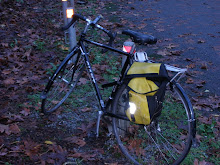Tuesday, February 18, 2014
Class, climate, and the need for free transit
December is wet and bone-chilling in Seattle. So, imagine climbing from bed two hours early to catch three busses to work. Welcome to the reality of commuting in the wake of public transit cuts. In the dark of an early morning commute, a bus rider told me this horror story as I drove my electric trolley up Beacon Hill, where she works. “It could get worse,” she lamented. Her commuter train is a candidate for elimination because it’s “not profitable.”
I shake my head in dismay, yet we both know her plight isn’t unique. Public transit is in a world of hurt. Here, in Puget Sound, service to the north runs one-third the levels of 2008. And south, the service for blue-collar Tacoma is endangered. In King County, home of Microsoft billionaires and Amazon tax evaders, Metro yanks bus stops, eliminates routes, and cuts rest breaks for drivers to balance its budget.
Like public transit agencies across the U.S., Metro survives on regressive sales taxes, which plummet along with workers’ paychecks. Fares are 80 percent higher than before the Great Recession. Wealthy employers give their workers free passes or service on Wifi-equipped private busses. But Walmart associates and other low-wagers pay $2.50. The poorer you are, the more you pay.
Seattle pretends a liberal, green reputation. The Ride Free Area, covering the central business district, lent credence to that image. Until recently, homeless people rode free, alongside bankers, tourists, and baristas. The “RFA” reduced traffic jams and boarding the bus was a breeze. Then, in Sept. 2012, local officials axed the RFA. Supposedly this was to save money. I think it was more about privatization and the nationwide push to run public services like a business. Pricey security mushroomed. So did slick ad campaigns to promote bus-riding. The transit bureaucracy is growing, as are lines of stressed-out commuters waiting to board the “pay-as-you-enter” bus. Traffic is jammed. Tempers, road rage and car exhaust fumes are worse now that the RFA is gone.
Sadly, this is turning many taxpayers against public transit. The formula is familiar to those who work at public schools or the Post Office. If a public system works, break it through funding cuts and mismanagement.
Here in Seattle, the privatization and cuts tsunami is just hitting. From riders — er, customers — I hear it’s far worse elsewhere. Whole stretches of the U.S. have no public bus service at all. As bus coverage thins, so does the ridership of homeless, elderly and wheelchair-bound people. Where are they? Locked down at home or under a bridge? For the working poor, a change in jobs becomes a nightmare or a return to the old gas-guzzler, if that’s an option.
In short, society is hurtling backward, both economically and environmentally, at a time when forward motion is desperately needed. Heat-trapping pollution rose 3 percent last year and scientists are abandoning hope of limiting the rise in the earth’s temperature to 2 degrees Celsius — believed necessary to avoid climate catastrophe. Rising sea levels are drowning island countries like Tuvalu. Such facts call out for dramatic action, like massively expanding public transit and making it free. How to pay for it? For starters, nationalize the oil industry under workers control!
Some call this pie in the sky. But the dreamers are those who think society can continue on its present course. Imagine the pocketbook relief that free transit would give the working class. And the millions of tons of carbon dioxide it would eliminate.
Some counter that Americans won’t abandon their cars. But in 2008, before cuts and fare hikes shredded public transit, people gladly parked their cars as gas prices soared. Most people, given a choice, would rather save paradise and not put up another parking lot!
This isn't to suggest that free, expanded transit can be won without a radical mass movement. Such a project requires mobilizing millions of climate and class-conscious people to demand that politicians sacrifice the profits of energy goliaths, rather than the planet. It would mean calling out labor officials who refuse to dump the Democrats. For example, the Amalgamated Transit Union endorsed President Obama after he signed legislation the union called a “death blow” to public transit! This has to stop.
As the globe heats up and people scramble to pay their bills, the call for free, expanded transit will gain ground, especially if radicals raise the banner. Let transit workers and riders lead the way. For the sake of the planet and all people, it’s an idea whose time has come.
Originally published in the Freedom Socialist newspaper, Vol. 34, No. 1, February-March 2013
www.socialism.com
Labels:
ATU,
bus cuts,
climate change,
environment,
global warming,
transit,
transportation
Subscribe to:
Comments (Atom)

